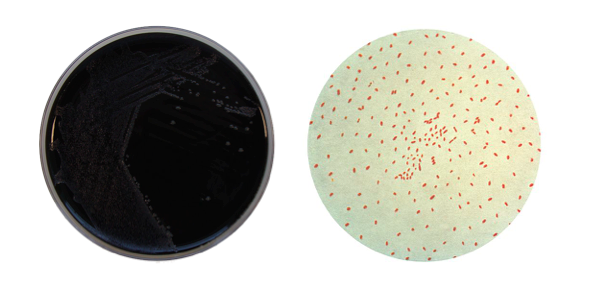Whooping cough exposure at upper school

Courtesy of Wikimedia Commons
Pertussis bacteria is shown through a microscope. The bacterial infection manifests in a runny nose, low fever and mild cough before escalating to a severe cough after one to two weeks.
After an Upper School student tested positive for pertussis, Debra Nott, Upper School nurse, sent out a school-wide email with information on pertussis and treatment.
The infected student attended school while contagious from Aug. 20 to Sept. 8. Nott’s notification contained an exposure notice from the Public Department of Health and a list of pertussis symptoms. The bacterial infection manifests in a runny nose, low fever and mild cough before escalating to a severe cough after one to two weeks.
“It’s transmitted through coughing, sneezing, the saliva, talking. You’re talking and saliva particles come out,” Upper School Nurse Claire Kelly, said. “Use good handwashing techniques. If you are around someone who’s coughing a lot, keep that in in mind and maybe keep your distance. Make sure you don’t share any drinks or food.”
The parents of the infected student contacted Harker yesterday after the student tested positive for pertussis in a pediatrician’s swab test, in spite having received immunization for pertussis two years ago with a Tdap vaccine. The vaccine is generally only 80% effective, but those who do become infected have a milder case of whooping cough than someone unimmunized.
Nott assured the students and parents in her email that further infection was unlikely. Several years ago, a single student at Harker contracted whooping cough and did not infect anyone else. In an immunized community like Harker, further spread is unlikely.
“I’m the one who has students coming in here all the time, so if anyone is coughing or sneezing, I would get a lot of exposure most likely, and I’m really not that worried about getting it,” Kelly said.
As of Aug. 3, The California Department of Public Health has reported over 3,400 cases of pertussis in 2015. 126 cases led to hospitalizations, 71% of whom were infants under 4 months old. Apart from 2010 and 2014, years when California declared a pertussis epidemic, 2015 has the most cases of whooping cough since 1950.
Parents and students can call the Public Health Department at at (408) 885-4214 or Debra Nott at (408) 553-0562 with further questions.

Meilan Steimle (12) is co-Editor-in-Chief of the Winged Post. She was a reporter her freshman year, Winged Post Opinion Editor her sophomore year and Winged...


















![“[Building nerf blasters] became this outlet of creativity for me that hasn't been matched by anything else. The process [of] making a build complete to your desire is such a painstakingly difficult process, but I've had to learn from [the skills needed from] soldering to proper painting. There's so many different options for everything, if you think about it, it exists. The best part is [that] if it doesn't exist, you can build it yourself," Ishaan Parate said.](https://harkeraquila.com/wp-content/uploads/2022/08/DSC_8149-900x604.jpg)




![“When I came into high school, I was ready to be a follower. But DECA was a game changer for me. It helped me overcome my fear of public speaking, and it's played such a major role in who I've become today. To be able to successfully lead a chapter of 150 students, an officer team and be one of the upperclassmen I once really admired is something I'm [really] proud of,” Anvitha Tummala ('21) said.](https://harkeraquila.com/wp-content/uploads/2021/07/Screen-Shot-2021-07-25-at-9.50.05-AM-900x594.png)







![“I think getting up in the morning and having a sense of purpose [is exciting]. I think without a certain amount of drive, life is kind of obsolete and mundane, and I think having that every single day is what makes each day unique and kind of makes life exciting,” Neymika Jain (12) said.](https://harkeraquila.com/wp-content/uploads/2017/06/Screen-Shot-2017-06-03-at-4.54.16-PM.png)








![“My slogan is ‘slow feet, don’t eat, and I’m hungry.’ You need to run fast to get where you are–you aren't going to get those championships if you aren't fast,” Angel Cervantes (12) said. “I want to do well in school on my tests and in track and win championships for my team. I live by that, [and] I can do that anywhere: in the classroom or on the field.”](https://harkeraquila.com/wp-content/uploads/2018/06/DSC5146-900x601.jpg)
![“[Volleyball has] taught me how to fall correctly, and another thing it taught is that you don’t have to be the best at something to be good at it. If you just hit the ball in a smart way, then it still scores points and you’re good at it. You could be a background player and still make a much bigger impact on the team than you would think,” Anya Gert (’20) said.](https://harkeraquila.com/wp-content/uploads/2020/06/AnnaGert_JinTuan_HoHPhotoEdited-600x900.jpeg)

![“I'm not nearly there yet, but [my confidence has] definitely been getting better since I was pretty shy and timid coming into Harker my freshman year. I know that there's a lot of people that are really confident in what they do, and I really admire them. Everyone's so driven and that has really pushed me to kind of try to find my own place in high school and be more confident,” Alyssa Huang (’20) said.](https://harkeraquila.com/wp-content/uploads/2020/06/AlyssaHuang_EmilyChen_HoHPhoto-900x749.jpeg)


